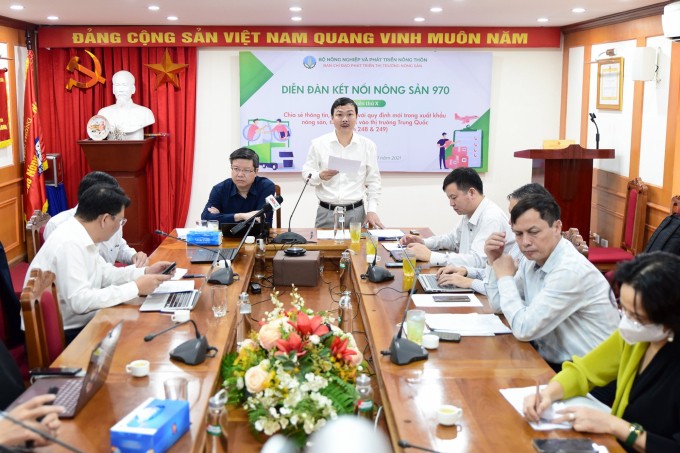- Giới thiệu
- Nhóm Công tác
- Tin tức
- Thông tin về FTA
- Tài Liệu
- Sự kiện
- Liên hệ
China tightens import control at the border
SPS Vietnam Office, the Plant Protection Department (PPD)and expertise agencies under the MARD committed to accompanying and showing enterprises how to maintain export activities to China

Forum 970 connecting agricultural products (tenth session) themed "Sharing information, adapting to new regulations on exports to China. Photo: Nongnghiep.vn
The Steering Team of Forum 970 connecting agricultural products in collaboration with the Plant Protection Department (PPD), the National Agro-Forestry-Fisheries Quality Assurance Department and SPS Vietnam Office organized an online forum on sharing information, adapting to new regulations on agricultural and food exports to China on November 6.
In recent years, China has made multiple changes in food safety and biosecurity management for food and farm produce exported to the Chinese market. Accordingly, the enterprises exporting agricultural products and food to China must comply with the country's Law on Food Safety and Biosecurity.
In the past, when receiving registration dossiers for agricultural product exports from the Vietnamese enterprises through the Ministry of Agriculture and Rural Development of Vietnam (MARD), the General Administration of Customs of China (GACC) would go and visit the enterprises in Vietnam for inspections. However, the GACC will now evaluate the enterprises' papers before organizing online inspections. Many of the Vietnamese enterprises are facing difficulties due to these changes.
Le Thanh Hoa, Director of SPS Vietnam Office committed to cooperating with Vietnamese Agricultural News and the relevant agencies under the MARD to provide information to enterprises so that they can adapt to the changes from China (Orders 248, 249).
From now until the end of 2021, the focus will be working with the National Agricultural Extension to deploy the models of good agricultural practices. Basing on ASEAN GAP standards, the enterprises will develop and set up cultivation areas meeting the new standards.
Besides, SPS Vietnam Office will coordinate with the PPD to train on technical standards, preparing registration dossiers for enterprises to meet the requirements of Orders 248, 249 in terms of cultivating, harvesting,packaging and transporting.
"Those who are in charge of the enterprises' technical issues must understand thoroughly the requirements and the standards of quality supervision. The Chinese side can inspect online at any time under Orders 248, 249," Hoa emphasized.
Hoa also said that the large or FDI enterprises often "standardize" better than domestic ones. Therefore, the enterprises have to not only adapt to Orders 248, 249 but also research the information of export markets carefully.
After informing of regulations and procedures for exporting to China, Hoa stated SPS Vietnam Office and Vietnamese Agricultural News will join together to provide detailed information of the individual market such as EU, CPTOO or Northeast Asia, avoiding unnecessary technical obstacles.
Huynh Tan Dat, the PPD's Deputy Director said the Chinese side is tightening goods controls at the border, in particular for unofficial trade. Along with that is the requirement for opening door to each type of product. Additionally, the Chinese side is controlling imported products by protocols and requests for declaring codes for export growing areas and packaging facilities.
Notably, the list of regulated pests from China includes 500 species of which there are a number of common pests discovered in the fresh fruits imported from Vietnam.
"The enterprises need to pay great attention to common pests to remove them before exporting, training and coordinating with localities to develop a database to speed up granting codes for export growing areas," said Dat.
The DDP has so far collaborated with the GACC to approve approximately 2,000 coded for export growing areas and nearly 1,800 packaging facilities. Because fresh fruits in particular and farm produce in general remain Vietnam's key export products to China, it will be busy to carry out the work of quarantine and food safety inspections from now until the end of 2021. On the side of enterprises, although there is not much time left many of them have not completed the dossiers yet.
The measures taken by the DDP are developing a group of ToT lecturers then organizing training courses for enterprises and local authorities. Next, the authorities will work with exporting countries to boost the application of Information technology in the management and improve the standards.
Source: Nongnghiep.vn
Tin liên quan
PSAV Attends the 30th Anniversary Celebration of Cargill Vietnam2025/10/23
Plant health management helps increase coffee yield up to 15%2025/10/16
An Giang to host 2025 OCOP forum for sustainable development2025/09/25
Viet Nam and France foster cooperation on blue economy and sustainable environment2025/09/29
Agriculture and Environment exhibition ready for National celebration2025/08/27



 Điều lệ hoạt động
Điều lệ hoạt động



















































